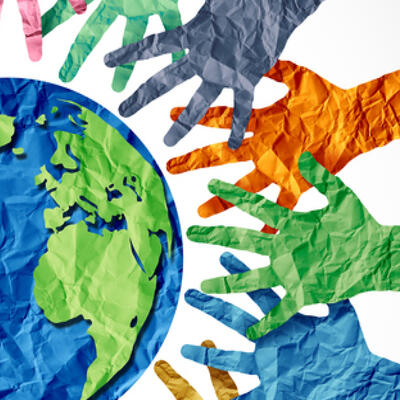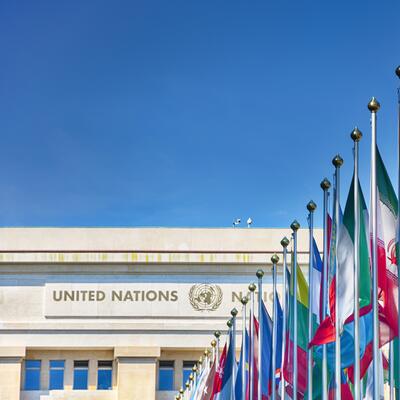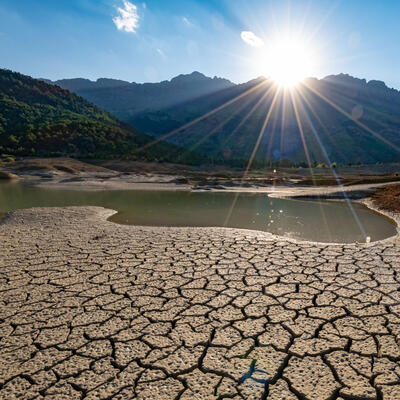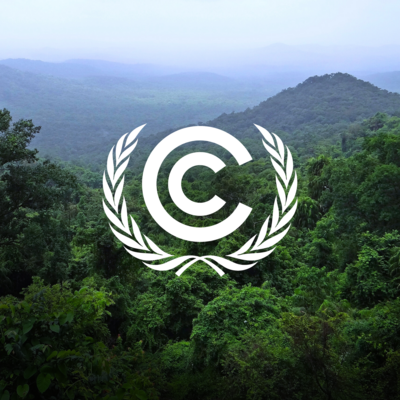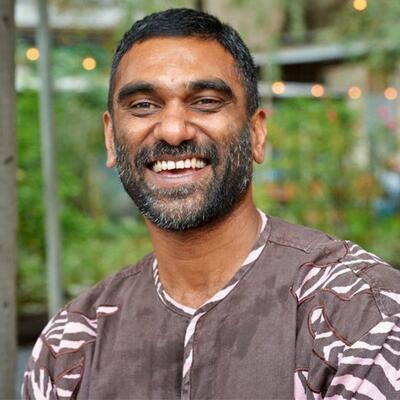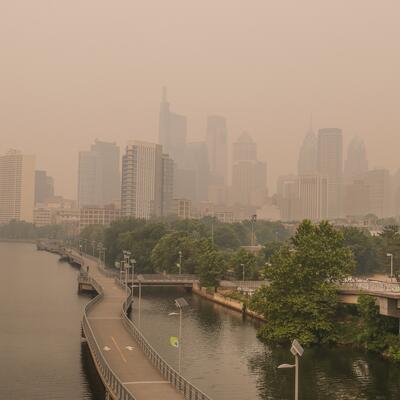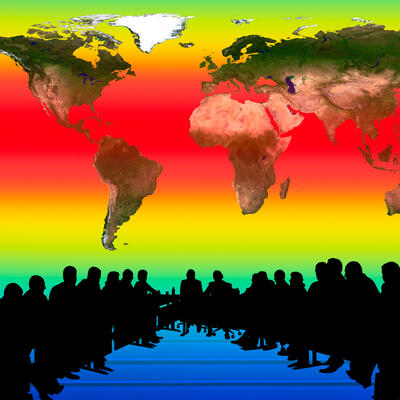
What’s on Tap at COP26 in Glasgow
Guests

Kate Larsen

Albert Cheung
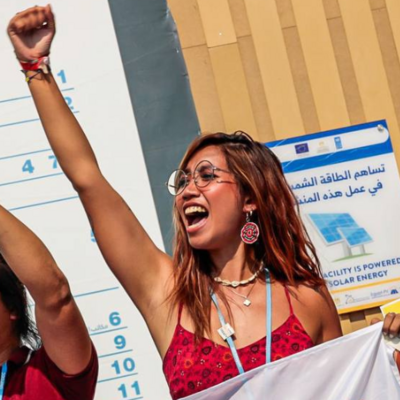
Mitzi Jonelle Tan
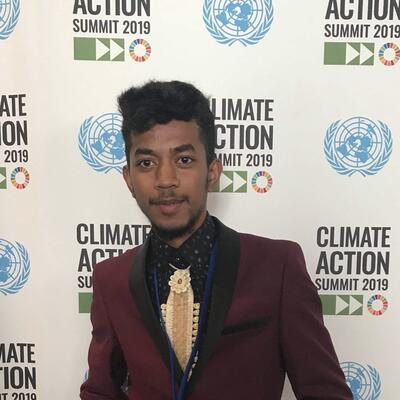
Carlon Zackhras
Summary
Delegates from around the world are set to convene in Glasgow at the international climate summit known as COP26 – ideally to hammer out commitments to reduce carbon emissions in hopes of avoiding the worst impacts of climate disruption.
Kate Larsen, a director at the research firm Rhodium Group, says the meeting will demonstrate whether voluntary commitments under the Paris agreement are working, and whether countries are willing and able to make additional commitments to reduce emissions even further in the 2030 timeline.
“Are countries hearing the science and the activists and watching what industry is doing? And are they taking that next step in a serious way?”
Larsen says while these climate negotiations no longer require countries to come together to write treaty agreements, there is still significant pressure for leaders to demonstrate they are taking action toward a net zero future – not just by midcentury as most have promised, but concrete steps they will take in the next decade.
“And so, you'll see some heads of states and other leaders twisting each other's arms to try to go even further,” Larsen says.
Albert Cheung, London-based head of global analysis for the research firm BloombergNEF, says it’s important that the U.S. is back at the climate table this year, after withdrawing from the Paris agreement under President Trump.
“We can’t get anyone near global net zero without the U.S. taking real action. And I think it matters as well because the developing world won’t act if the rich world doesn’t.” However, Cheung adds that the U.S. has not demonstrated itself to be a constant climate actor in the past, and this year its role may be a bit less important.
“In the intervening four years while the U.S. was absent, a lot changed. A lot of other countries and regions: China, Japan, Korea, Europe all pledged to get to net zero. They’re all looking at policies and how to get there.”
China has pledged to be net zero by 2060 – ten years later than most countries – and the U.S. and most of the world would like to see China do more. But Cheung says China’s recent pledge to stop financing overseas coal is a significant step, and demonstrates that President Xi Jinping is responsive to the global climate discussion.
There’s been increasing pressure on organizers of COP26 to ensure fair and equitable representation of countries in the Global South – particularly those already facing climate impacts who will continue to suffer as the world tries to slow the effects of fossil-fuel-driven climate disruption.
Mitzi Jonelle Tan is a full-time climate justice activist based in the Philippines.
“How do you expect to have a climate conference where you have climate policies being decided on by people who have never seen or even faced any semblance of the climate crisis?” she says. “And that’s why it’s so important that we have people from the most affected areas in these climate negotiations. And then going beyond representation, it's not just about having people there but listening to people who are there. Making sure that the changes that happen are because of the people who are most affected because it's been way too long...emissions are still rising, people are still suffering.”
She and others want to see countries from the Global North take responsibility for their emissions.
“Climate finance isn't help; it’s reparations. They caused this, they have to pay. They have the climate debt to the Global South and to humanity.”
While she’s hopeful for some strong commitments and pledges at COP26, she says climate justice is a continuous process that doesn’t start or end at that conference.
Related Links:
Youth Advocates for Climate Action Philippines
America Is All In, report from Bloomberg Philanthropies
Full Transcript
Greg Dalton: This week on Climate One, we dive into what’s at stake at the COP26 climate summit in Glasgow.
Kate Larsen: Does the Paris agreement system with voluntary commitments, is this working? Are countries hearing the science and the activists and watching what industry is doing and are they taking that next step in a serious way?
Greg Dalton: What’s the role of the U.S. and other major players?
Albert Cheung: It is great to have the US back at the global climate table. We can’t get anyone near global net zero without the US taking real action. And I think it matters as well because the developing world won’t act if the rich world doesn’t. And the US is really at the front of that.
Greg Dalton: And will those most affected have a real say in what commitments are made?
Mitzi Jonelle Tan: It's not just about having people there but listening to people who are there. Making sure that the changes that happen are because of the people who are most affected because emissions are still rising, people are still suffering, nothing is changing.
Greg Dalton: What’s on Tap at COP26 in Glasgow. Up next on Climate One.
Greg Dalton: This is Climate One. I’m Greg Dalton. For weeks we’ve been previewing different aspects of the upcoming international climate summit in Glasgow known as COP26. In a few short weeks, delegates from around the world are set to convene and hammer out commitments to reduce carbon emissions in hopes of avoiding the worst impacts of climate disruption.
Six years on from the Paris agreement, is there finally enough urgency to turn ambition and promises into action? My guests today are Kate Larsen, a director at the research firm Rhodium Group, and Albert Cheung, head of global analysis for the research firm BloombergNEF. We recorded this conversation less than three weeks before COP 26, when much was still happening in preparation for the conference. I asked Kate Larsen to set the stage of what's at stake in Glasgow.
Kate Larsen: So, the Paris agreement was agreed in 2015, we’re six years in and it's really the first test of whether countries are willing and able to make additional commitments to ratchet up their ambition to reduce emissions even further in the 2030 timeline. And although these climate negotiations no longer require countries to come together to fashion language in terms of treaty agreements it’s really about leaders coming together and showing and demonstrating that they are taking that action towards a net zero future. So, you'll see countries and companies making commitments largely around getting to net zero by midcentury, which are very important for setting the stage of where we’re headed. But more importantly we’re looking in the next decade: What kinds of concrete steps are countries taking and that's, a large handful of countries have made those commitments already and some have not yet. And so, you'll see some heads of states and other leaders twisting each other's arms to try to go even further. And I think what's at stake is does the Paris agreement system with voluntary commitments is this working? Are countries hearing the science and the activists and watching what industry is doing and are they taking that next step in a serious way?
Greg Dalton: And, Kate, a new report from International Energy Agency says existing pledges and policies will cut emissions about 40% by 2050. Scientists say we need to get to 100 so we’re sort of half way there, is that right?
Kate Larsen: Yeah, and that’s a mix of some countries haven't made their commitments yet so we could see a few more coming out in the days before the COP or at the COP. But there's also a large share of major emitting countries that have already made their commitments and they just don't go far enough. China for example, its commitment largely has its emission staying flat for the foreseeable future and that's a huge issue because China contributes nearly a third of global emissions today. So, that really reduces the globe’s chance of getting there with some of those large industrial countries. Again, also the US and other countries have made really ambitious commitments. Now we need to see if they can deliver.
Greg Dalton: Albert, just as we’re coming to this very important international summit there’s a global energy crisis emerging at a very difficult time. Gasoline shortages in the UK seven-year high and oil prices record high prices for fossil gas in Europe. How is that affecting the market in economic context of the summit?
Albert Cheung: I think it does cause quite a different color on the summit from maybe what we might have expected a few months ago. I think it’s really important just remember that the current energy crunch has many, many different factors driving it. The COVID recovery, a cold winter last year that depleted gas storage in various regions, low Russian exports. And yes, part of it is we’ve had low wind in Europe this summer which means we’ve had to rely on gas a bit more. But I think what’s very, very clear and we need to remember this is first of all is the current energy crunch cannot be in any way blamed on the energy transition. I think anyone who says that would be disingenuous. But I think with that said, there are I think some really important lessons that we need to bear in mind. I think we need to know that we’re not gonna solve climate by simply restricting the supply of fossil fuels; we can’t just force these fuels out of commission. We need to massively ramp up both supply and demand for clean energy. And that what’s gonna help us win the climate fight. So, I think we just need to really stay laser focus on that. And even though right now we’re seeing some volatility in the market.
Greg Dalton: Kate, nothing makes political leaders as anxious as rising gas prices. The Tea Party Movement in 2010 was born at a time of high energy prices. So, how are high energy prices affecting the political context of leaders going into Glasgow?
Kate Larsen: Yeah, this is a critical moment. While some countries have again set those goals and targets. It's all about how the rubber hits the road and making those policies and that requires domestic constituencies to agree to adopt those policies. And we’re seeing at a moment in Europe where elections are highly affected by people driven to care about climate change with the flooding and other events. But now is the moment when, now that the EU has set its ambitious target of 55% reductions by 2030. Two years now of policymaking among the EU member states, and with political tensions around energy and memories of French activists protesting higher gas prices that all plays into this political dynamic and of course we’re seeing that in the US as well, with an energy crunch in Texas over last winter in anticipation of that. It's a political concern and one that I think doesn't stop the overall intention to meet those goals. But it really drives the policymaking in the politics around the policies themselves.
Greg Dalton: At the time of this recording it looks like Pres. Biden is not gonna get an infrastructure bill or reconciliation bill through Congress before the G20 summit in Italy and then the climate summit in Glasgow. So, there's a lot of climate pieces in both of those bills. Kate, what does it mean with Biden kind of going to Glasgow empty-handed?
Kate Larsen: Yeah, it’s a little bit of a déjà vu moment when Pres. Obama went to the Copenhagen Summit Congress was debating cap and trade legislation with the Waxman-Markey Bill and that was what the US was coming to the world to say we’re back in action and we’re getting serious. And as we all know that moment the US failed to deliver on that moment. And so, the world after four years of the Trump administration and pulling out of Paris is very keen to focus on the real actions, not just the promises that the Biden administration makes today despite a very ambitious 50 to 52% emission reduction target. The world is looking to see what solid action is the Biden administration gonna take. Getting to 50 to 52% will require an all of the above strategy that includes the type of legislation that's being discussed today in Congress that will be critical to both accelerating the clean energy deployment of renewables and other clean technologies, but it's also critical because that legislation really brings down the cost of the types of regulations that EPA and other Biden administration agencies are working on to regulate pollution from cars and trucks from power plants all across the economy. So, without legislation the Biden administration will be a little bit of a handicap in Glasgow. They will come however, potentially, with a set of plans to regulate industries that is within the Biden administration's authority. They’ll also be coming with money on the table, commitments to ramp up climate funding to developing countries up to $11 billion. So, the Biden administration is waiting to see what's happening in Congress, but they're putting together a package that they hope will be enough. But again, what Biden is coming to Glasgow hoping to do is to leverage other countries like China, India and others to take more action and that will be much more difficult to do if Congress fails to act again.
Greg Dalton: Yeah, the US seems like an unreliable and unpredictable partner. Albert Cheung, does this matter, the US leadership? Is Europe picking up the slack and leading this, are companies and markets picking up some of the slack since the US is not the climate leader that it once was?
Albert Cheung: It is great to have the US back at the global climate table. I think it really does matter. It matters first and foremost because the US is still a major emitter. It’s somewhere around the tenth of global emissions. We can’t get anyone near global net zero without the US taking real action. And I think it matters as well because the developing world won’t act if the rich world doesn’t. And the US is really at the front of that. With that said, I think the US matters a bit less than maybe some commentators in the US may believe. And I say that respectfully as the only non-American here recording this show.
Greg Dalton: Shocking.
Albert Cheung: Yeah. If you think back to 2015 it was the US and China coming together that made the Paris agreement possible. It was the Obama team's engagement that made all of this possible where we are today, made that possible. But I think in the intervening four years while the US was absent a lot changed. A lot of other countries, regions, you know, China, Japan, Korea, Europe all pledged to get to net zero. They’re all looking at policies and how to get there. And that’s in spite of the US being absent for four years. Not even really driven by anything that Biden has done particularly since coming back to office. And I would also say again respectfully, I don’t think the US has a track record of being a reliable partner on climate. America signed the Kyoto protocol but didn’t ratify it if you remember, you know, if we go back in history. So, I think it’s always been a bit on again, off again on climate action.
Greg Dalton: Kate Larsen, according to the Climate Action Tracker of all the nations in the world only the small West African country The Gambia has specific policies not just goals and pledges that are compatible with the Paris agreement. So, what’s your read on this and the prospects for raising ambition at COP26 if that’s the case?
Kate Larsen: Yeah, we talk a lot about which countries are on track. You know, some countries are on track with their goals because they set goals that they knew they could achieve, right. And those goals are inconsistent with getting to net zero by midcentury. And some of those countries are so far may change before the COP but China, India, Australia, Indonesia, Russia, Brazil, Mexico, these are pretty large economies. Then there are others like the US, UK, EU, Norway and others who have made really ambitious new commitments. Japan and Canada are in that group. But the real hard work starts now and they are not on track to meet those ambitious commitments and need to do the policymaking today. And then there's the whole rest of the world who really needs financial support. They can’t do this on their own and they're not making the most ambitious commitments because they're waiting to see what the rest of the world does. And so, we’re all waiting for all of the right conditions and I think it's at this moment now where this needs to happen in the next decade. We need to make the transition in the power sector, largely on transportation for passenger vehicles that needs to happen in this decade, so that in the following decade 2040 and beyond we start focusing on the really hard stuff like decarbonizing industry aviation shipping. There's a lot of work to be done and I think that there are few economies that are really focused on doing this. Again, Europe is at the head of the pack with a policymaking machine that has demonstrated success over time with an emissions trading system and paired with policies that have demonstrated success in reducing emissions over time. And just fewer countries have that kind of experience again with the US are back and forth with Congress and regulations. We need to establish that same kind of track record.
Greg Dalton: Albert, most of the carbon pollution up in the sky is red white and blue, which means it's American and French and Russian and British. But China is the biggest emitter now. Some people will say like, you know, really what China does kind of determines the whole ballgame. How significant is it that China recently said they’re no longer going to finance overseas coal plants?
Albert Cheung: I think it’s really significant. What China’s done over the last couple of years well maybe even over the last 10 years is really try to assume a position of climate leadership. Everyone can see China can see that it has driven the lion’s share of emissions growth over the last two decades and more because it’s been pursuing an economic growth model driven by investment in infrastructure. And so, I think at the same time what it’s trying to do is build industrial strength in clean energy, electric vehicles and so on and start to do the right thing on climate as well. So, we saw the carbon neutrality pledge last September. And I think what was sort of interesting at that time was, you know, that was a great surprise everyone was quite I would say, pleasantly surprised at that carbon neutrality pledge when President Xi presented it in September 2020. But everybody then immediately turned around and said, wait but what about China’s overseas financing fossil fuel in other countries? So, and then a year later, September 2021, Xi stands up and said, we will now stop developing overseas coal. So, I think it’s really interesting to see that China is responsive to the debate the discussion globally. I think it matters because China is the largest public funder of coal overseas coal. So, I think what needs to happen now is that you can’t just take that pipeline away you also then have to replace it with clean energy. We can’t tell folks in the developing world, cool, we’re just not gonna build you any power plants now. So, we need to find ways to drive more finance into clean forms of electricity so that we can continue to provide access to clean and reliable energy across all of these countries.
Greg Dalton: You’re listening to a Climate One conversation about what’s at stake at COP26 in Glasgow. Our podcasts typically contain extra content beyond what’s heard on the radio. If you missed a previous episode, or want to hear more of Climate One’s empowering conversations, subscribe to our podcast wherever you get your pods. Coming up, the impact of climate pledges from the international corporations responsible for a large part of greenhouse gas emissions:
Albert Cheung: They create an almost deafening background noise for politicians who maybe need the courage or maybe need a bit of a nudge to do the right thing when it comes to passing legislation.
Greg Dalton: That’s up next, when Climate One continues.
Greg Dalton: This is Climate One. I’m Greg Dalton, and we’re talking about what’s on tap at COP26 with Kate Larsen of the Rhodium Group and Albert Cheung of BloombergNEF.
Greg Dalton: China has pledged to be net zero by 2060--ten years later than most countries--and the U.S. and most of the world would like to see China do more. But as an emerging superpower China doesn’t like to be seen to be bowing to external pressure, and the U.S. currently has a very frayed, tense relationship with China over trade, military power in the South China Sea, and other issues. Kate Larsen says climate change has been the bright spot in recent years of US-China relations.
Kate Larsen: It was the US and China coming together to unlock agreement around the Paris agreement itself, which was a huge first step, and I think a lot of people hoped that was the beginning of continued cooperation again that these two superpowers would continue in lockstep showing the world how we would do this together. And I think times have changed a lot both in terms of the US and China relationship, but also in the nature of our sort of climate journey, right. So, now that we have the agreement, countries are really needing to look internally about reducing their own emissions, making the investments in the infrastructure and technology. We're also competing in a global marketplace to be the countries that produce the technologies that others are needing. And so, you know that that starts to get into the tensions around technology and security between the US and China. There's still potential to cooperate the types of agreements that special envoy Kerry is traveling around the world getting partners among countries. So, looking for ways that countries that emit methane emissions super pollutant can commit together to reduce emissions. A lot of the effort beyond just adopting policy domestically is working with partners to ensure that everyone is doing it together so that it can help reduce costs for everyone else to do the same thing. The US is not and has said that it will not sacrifice the other demands in terms of human rights and national security. And as that becomes more heated, it becomes harder to see how the US and China sit down at a table and talk about infrastructure and investment policy around clean energy in a way that's cooperative rather than competitive.
Albert Cheung: I’m actually slightly more relaxed about the competitive element here. I think there are always gonna be geopolitical tensions whether it’s about territorial disputes or human rights and other issues. I think competition to win the clean energy race competition to develop the best supply chains and the best technologies is a good thing for the climate outcomes that I think we are seeking for the energy transition that I think we are seeking. I think there are gonna be concerns about which countries have the best access to raw materials and which countries have access to critical components and refining capacity and things like that. And it is true that China is winning that particular race right now. But I think competition is gonna help us and I think the areas in the climate field where we need cooperation are actually areas like, you know, I think this overseas coal finance issue which we talked about before, where you’re doing some sort of an agreement that says, why don’t we all just stop doing that. And it seems like we all seen cooperation there.
Greg Dalton: So, there’s places for cooperation places for competition. How does that fit into the auto industry because some people see China leading on batteries leading on electrification of mobility and EV sales are rising in China. Gasoline and diesel sales are down. is there, what is that mean for the global industry and is there a risk for China winning that?
Albert Cheung: Yeah, I mean just to give a few numbers right now. We're forecasting global EV sales this year to hit five and a half million units up from three million last year. When you look at percentage of sales globally that’s about 8%, we’re at about 8% of all new car sales EVs right now. In North America it’s about 3 or 4%. In China it’s about 12%. And in Europe it’s somewhere around 15 I think, 15, 16% from memory. So, we are seeing a two or three speed EV transition right now with China and Europe really leading it with strong support, both have supply side support and also demand side regulation that’s driving it. And I do think that at the end of the day the demand markets where the vehicles are being sold are gonna be the markets that succeed in terms of developing the supply chain and the manufacturing. So, I think that if the US wants the big three to lead on electric vehicles it needs to create domestic electric vehicle market. And from there you can build the domestic battery supply chain and so on and so forth. I think without that it’s very challenging.
Greg Dalton: Albert Cheung, just 167 companies account for over 80% of global industrial greenhouse gas emissions. At least a hundred or so of those focus companies has set a net zero target with more piling on every day including McDonald's, according to BloombergNEF this will result in cutting greenhouse gas emissions by almost 4 billion metric tons equivalent, you know, this increases that's quite a bit just short of China's current annual emission. So, let's talk about the driver of corporate pledges. How meaningful are they? Are they smoke and mirrors greenwashing are they really important levers for bending the curves downward?
Albert Cheung: The short answer is yes and yes and yes. We’re tracking about 8 gigatons so 8 billion tons of corporate emissions which are now pledged to get to net zero. So, if you take that at face value, that is let’s see it’s about 1/6 of global greenhouse gas emissions. Now there’s gonna be double counting in that because some of that is scope 3 and scope 3 you end up with double counting.
Greg Dalton: And explain what scope 3 is.
Albert Cheung: Scope 3 is when a company says we’re gonna reduce the emissions that either come from our suppliers or come from our customers when they use our products. So, it’s not the emissions of the actual company itself. And so, for that reason if you include scope 3 in these commitments that means you may be double counting because you’re scope 3 someone else is scope 1 which is your direct emissions. So, anyway, 8 gigatons it’s a big number. I think it does matter but maybe not for the reasons that listeners may suspect. Corporate pledges to get to net zero reduce emissions will marginally affect the uptake of things like renewables and electric vehicles energy efficiency. I think the downside is that a lot of these pledges will rely in my view too much on carbon offsets. And I think carbon offsets are really not at least the offsets that are around avoided emissions are really not part of the net zero solution. I think we haven’t yet got to a point where we have carbon removal offset which really what we need to get to to be compatible with the net zero future. The reason I think these corporate pledges really do matter though is actually because they create an almost deafening background noise for politicians who maybe need the courage or maybe need a bit of a nudge to do the right thing when it comes to passing legislation. I think the more business leaders come forward and say we’re doing this it’s the right way to go the more political space it creates for elected leaders in the towns that, you know, that the jobs are sited in and so on and so forth. To go to that parliament and say, yeah, we support these moves to reduce emissions because the leaders or the businesses that have the jobs in our jurisdictions support it too. And I think that is really the game that is being played here, you know, in the run up to COP I think that’s what the corporate commitments are really gonna do.
Greg Dalton: Kate Larsen, your take on that corporation. Chevron came out recently with a net zero pledge. It doesn't include the actual burning of its oil but its own operations, but it does seem that it puts the companies rowing in at least the same direction and no longer kind of frontal opposition to the shared international goal of Paris.
Kate Larsen: Yeah, I think there's a couple of reasons that again it helps the politicians see the course. It also keeps shareholders focused on those commitments as well and we’ll see the extent to which that makes a difference. But I think part of one aspect of the types of commitments that some companies are making and again it’s really not whether they said a net zero target, but it's how they get there. And some of these companies are really focused on helping to drive the policy and the progression of the types of technologies that they need to make emission reduction. So, many companies can purchase renewable electricity; that has largely been the first step for a lot of companies. But now a lot of companies are focusing on how do I decarbonize all of the freight that move my package to my customer. What about my packaging. What about the technologies that don't even exist yet for me when in terms of business travel? So, sustainable aviation fuels is an area where commitments by airlines and companies that have business travel to show that there is a market for these products that companies are starting to produce because without policy they are just too expensive for the average consumer. That's one area I think that will really make a difference. And another area that we haven't seen a lot of progress yet but I think is really critical is these same companies that have made these pledges have not been actively involved in lobbying in the US, in Congress on the infrastructure bill and the reconciliation package that we've been talking about these critical policies that will help US meet its target. Those companies, while they may be supportive of tax breaks for renewables and other components of the legislation, haven’t been actively involved in getting these packages passed. And I think when the rubber hits the road in terms of this legislation. We need those companies who have made those commitments to also be engaging in US policy because ultimately that will be what helps them get to net zero in the end.
Greg Dalton: As we look at COP26 in Glasgow there’s a lot at stake this is kind of the Paris agreement needs to start getting in motion. We have rising energy prices, concern about inflation, Biden is going pretty much empty handed to Glasgow. It's unclear some other heads of state will even go to Glasgow, you know, Xi Jinping, and Modi and others. So, what are the prospects of this is a real disappointment or just a hmm?
Kate Larsen: Expectations are high because of the challenge of the task in front of us and the task is becoming more and more clear with the science being very stark. The challenge is it's almost impossible for the commitments that countries are making to be sufficient. And so, we’re set up for a world in which every COP becomes a disappointment and that is why bringing heads of states to the COP they’re there to put their own personal reputation at risk by saying my country is making a big commitment and I'm standing up and doing as much as I can and they're there to twist the arms of the countries who aren’t doing enough. So, if you are a leader like Putin, Bolsonaro and others who are not on the list of attendees yet. They don't want to be there because there is a real risk that there will be finger-pointing of who is responsible for the “failure” of the COP. And I think this is the world that we’re going to be in for the next while is this arm-twisting moment of countries really needing to demonstrate that they are up to the challenge and that’ll be increasingly difficult over time.
Greg Dalton: Albert, you know, markets are all about expectations. Is it gonna be impossible to meet the expectations of this one given what’s happening going into it?
Albert Cheung: First of all, I feel quite glass half full about where we’ve got to over the last couple of years. We have 70% of the world’s emissions now committed to net zero. If you look at the countries, we have a lot of very ambitious NDCs, Nationally Determined Contributions, you know, the pledges to reduce emissions from UK from Europe from US. And but those NDCs are not enough to get us on track for the Paris goal of getting well below 2°. But Paris is what we have; like this agreement that we all have been working under for the last six years is a representation of how global diplomacy works. There is no world police that’s gonna make everybody do a thing that we want them to do. So, the arm-twisting that Kate’s talked about is exactly how this is all gonna play out. So, I think a really good outcome from COP26 would be if we have enough NDCs to get very close to 2° may be on track for 2° at best. I think that would be fantastic. We may have to stop slavishly sticking to 1.5 to stay alive we may have to say goodbye to that. But the point is that every .1° matters, every action every pledge matter. And so, we need to keep working with the people who are willing to work towards net zero and just keep pushing as fast as we can.
Kate Larsen: And I would also add before the Paris agreement global projections of emissions had us on track for about 4.6 degrees or higher centigrade. So, we should really take account of how far we've come. That is a massive amount of warming and destruction that we have avoided as a result of the Paris agreement, the commitments we’ve taken to date. Is it is enough? No. But as Albert said, every fraction of a degree really matters in terms of the human and natural impacts. And so, you know, each year that arm-twisting is important because those heads of states go back home, they hear from people on the street, they hear from corporations within their economy that are making those commitments. And I think the confidence grows in being able to make them year on year. So, all of this matters we should continue the drumbeat and we’ll continue to hold those leaders accountable each year.
Greg Dalton: Well, talking to both of you has made me feel better. Two of the smartest and optimistic people I know in this business. Kate Larsen and Albert Cheung thanks for coming on Climate One and talking about Glasgow.
Albert Cheung: Thank you very much.
Kate Larsen: Thanks, Greg.
Greg Dalton: The electric power sector is responsible for about a third of U.S. annual emissions. In recent years, many utilities have made commitments to fully transition to clean or carbon-free sources by mid-century. Climate One’s Ariana Brocious tells us about one especially ambitious plan and how these commitments might play at COP26.
Ariana Brocious: A report from the National Renewable Energy Laboratory, commissioned by the City of Los Angeles, found that LA had multiple pathways to reach 100% clean energy by 2035, without disruptions to the economy. The LA City Council then voted to make that transition by 2035 -- a decade earlier than originally planned. Jason Plautz [pl-OUTs], a freelance reporter who covers energy and the environment, says the strategies outlined in the report include shutting down city gas generating plants, deploying more solar, wind and battery storage and piloting green hydrogen.
Jason Plautz: Beyond the generating side, they're looking at adding solar panels to single-family and multi-family homes, there'll be rooftop solar that can supply some of the power, they're looking at electrifying buildings, electrifying transportation, in fact, they're looking at so much electrification of buildings and transportation that LA DWP the Los Angeles Department of Water and Power says they're going to double the amount of electricity that they produced by 2035 just to meet that expected demand.
Ariana Brocious: The city’s strategy also includes an equitable hiring plan.
Jason Plautz: What that means is communities in Los Angeles that have previously been affected by coal and gas fired power generation are going to be front of the line when it comes to hiring for these renewable energy jobs, clean energy jobs. Installing solar panels, making this transition.
Ariana Brocious: Plautz says that commitment to addressing environmental injustice will mean closing down gas plants inside city limits that disproportionately pollute certain neighborhoods and making sure no community is left out of the transition.
Jason Plautz: That could include incentives that help lower the cost of electrification or installing renewable energy on homes in some of these neighborhoods that could include direct outreach from the city to hear what these communities want to see.
Ariana Brocious: LA’s goal of all clean energy by 2035 is more ambitious than most of its peers, but Plautz says many utilities across the country have made carbon free or net zero commitments by midcentury.
Jason Plautz: Arizona Public Service says 100% in carbon free by 2050. Vista Corp, which is based in Washington State, has 100% by 2045. Dominion Energy, which is based in Virginia, serves some states in the southeast, they're saying net zero emissions by 2050, Duke Energy 100% by 2050, Idaho Power 100% clean energy by 2045.
Ariana Brocious: Those are mostly just voluntary pledges however, without binding requirements. Still, Plautz says there are several factors driving these shifts--state renewable energy standards, pressure from cities that buy power from utilities and are making their own carbon commitments, and the fact that prices of renewable energy continue to drop.
Jason Plautz: So certainly these goals have pushed, utilities have showed them where the market is heading, is showing what their customers want to do, but yes, on the other hand, the market's moving in this direction, and if you're an investor-owned utility, you're looking at the bottom line.
Ariana Brocious: Los Angeles is far from the only city setting emissions reductions goals. As nations gear up to meet at the COP26 climate summit this fall, Plautz says these moves on the local level can carry real weight.
Jason Plautz: The commitments we’re seeing from cities and states and utilities really work as a bottom-up approach to reach those goals. It's not just about what the Biden administration or what the federal government says, a lot of it has to do with what cities, states, counties, and utilities and even private businesses are doing, which can add up to reach those emissions goals.
Ariana Brocious: Jason Plautz cites a recent report from Bloomberg Philanthropies which found that cutting emissions from the power sector by 83% below 2005 levels can make up more than half of the total reductions the US needs to meet its Paris climate goals. For Climate One, I’m Ariana Brocious.
Greg Dalton: You're listening to a conversation looking ahead to what’s in store at the climate summit in Glasgow next month. This is Climate One. Coming up, a Phillapina youth climate activist on why diverse representation from the most affected countries is critical at COP26:
Mitzi Jonelle Tan: How do you expect to have a climate conference where you have climate policies being decided on by people who have never seen or even faced any semblance of the climate crisis? How do you begin to create the urgency around the climate crisis if you don't know how it looks? (:18)
Greg Dalton: That’s up next, when Climate One continues.
Greg Dalton: This is Climate One. I’m Greg Dalton. There’s been increasing pressure on organizers of COP26 to ensure fair and equitable representation of countries in the Global South--particularly those already facing climate impacts who will continue to suffer as the world tries to slow the effects of fossil-fuel-driven climate disruption. Mitzi Jonelle Tan is a full-time climate justice activist based in the Philippines. She is the convenor and international spokesperson of Youth Advocates for Climate Action Philippines. Carlon Zackhras is a youth climate activist from the Marshall Islands currently working on his undergraduate degree in Taiwan.
Climate change isn’t some distant concept for Mitzi Jonelle Tan. She grew up afraid of drowning from floodwaters in her own bedroom.
Mitzi Jonelle Tan: It was really scary. It was more of that uncertainty and not understanding why it was happening because no one is giving me any explanations. Like I saw the trees being uprooted sometimes waking up in the middle of the night with floodwater in my room. And everyone was just like oh that’s how it is but I didn’t understand that why is that how it is. And because the way we were taught climate change in school was very foreign and technical talking about melting ice caps and polar bears, and not about how what we are already experiencing the typhoons and the storm surges was the climate crisis.
Greg Dalton: You were activated on climate, Mitzi, in 2017 after talking to an indigenous leader in the Philippines. What was it about that person that reached you so deeply?
Mitzi Jonelle Tan: It was really this one interaction with this one person that made me realize that we needed collective action. So, he said something very, very simple. So, he was telling us about how they are being displaced and harassed and killed and militarized because the Philippines is one of the most dangerous countries in the world for environmental defenders and activists. Then ever so simply he shrugged and kind of chuckled even and said, that's why we have no choice but to fight back then he kept talking. And it was how he didn't even try to convince us of anything. It was a simple fact that you had to fight back and that is what really broke that bubble of privilege that who am I to not join the fight in the struggle for the planet that you live on. And I learned more about the climate crisis and I realized he was right. We have no choice but to fight back.
Greg Dalton: Carlon, you grew up in the Marshall Islands. What did you see and experience there that led you to become a climate activist?
Carlon Zackhras: Well, growing up I experienced a lot of inundations and I noticed that the shorelines were getting like really different and the structures of the shorelines were shrinking inwards to the island.
Greg Dalton: And then when you saw that happening did you have a way of understanding that were you learning about that in school did you think, well, this is just nature?
Carlon Zackhras: Like Mitzi said in school it was really technical and foreign for us. So, I really learned it from experiential knowledge and that's how I really realized that climate change was a threat to the Marshall Islands.
Greg Dalton: Mitzi, like other countries in the Global South the Philippines were for a long time a colony of the Global North, United States and Spain. How do you think that legacy affects how voices from the Global South are heard today?
Mitzi Jonelle Tan: I think that colonization is actually the root of the climate crisis and a lot of the problems we’re experiencing today. And even until today our culture, our politics, our economy is so linked to these Global North groups still. So, there is still that ongoing neocolonialism that's happening. And really, it's colonialism that changed the way that we viewed nature. Suddenly you haad people who were better than other people and better than the planet. You had certain groups, certain races, certain people who was above other things and other people that you could exploit. We still don't have Filipino words for a lot of things like trash and you could really see the difference in the language that we have. So, the words that we have borrowed from Spanish they are the words that are more exploitative of nature, they are the ones that are used to describe that. And you can really see how it is ingrained in a lot of indigenous and Global South cultures to protect and be part of that ecosystem instead of seeing nature as natural resources that we can use like a resource to grab hold of. And so, you know, that has caused how people from the Global South are seen as helpless and the term white saviorism actually, it's the modern version of the white man's burden, which is a poem that was created by someone from the US to convince the US president to save the Philippines and the barbarians here, to liberate them because this is the white man's honorable burden to protect the people the brown people in the Philippines. And so, it's so ingrained in my activism to fight for climate justice as well as social justice around the liberation of a lot of the Global South countries.
Greg Dalton: Yeah, learned a lot lately about how colonialism and fossil fuels are so deeply intertwined. And Carlon from 1946 to 1958 the US used the Marshall Islands as a nuclear testing ground, detonating 67 weapons in that 12-year period. The fallout forced evacuation of many islanders and for your compatriots may be people you know. How fresh is that history and how do those memories affect how people feel about potentially needing to evacuate again to escape sea level rise also caused by powers far away in the Global North?
Carlon Zackhras: So, when there's a sea level rise threat to the Marshall Islands for the Runit Dome there. So, there's a dome where the US scooped down the radiation under and then just left it there. So, it's cracked right now and we don't know if it's going to affect our fish and the livelihood of the people of the Marshall Islands because we really depend on fish over there in the Marshalls. It's going to not only affect us, but people all over the world because fish as we know, they migrate and from place to place people catch them and then consume them. So, I think remnants of that radiation from the Runit Dome can affect other people around the world.
Greg Dalton: Yeah, it’s all connected. And Carlon, in 2019 you spoke at COP 25 in Madrid. Who is in that audience and what did you say?
Carlon Zackhras: There were mostly interview people and a lot of adults. I was just voicing out the voiceless in the Marshall Islands like most of the youth because we barely have any say in decision-making in our government, in regional governments. And I just wanted to put it out there that as youth we know what to do and we can do what the adults do.
Greg Dalton: And how did the adults respond to you at that global conference of scientists and government ministers and advocates?
Carlon Zackhras: On camera it was, they were really happy with it. On paper, though like in actions I don't think I really scratched the surface into getting youth into the decision-making in all sorts of government arenas.
Greg Dalton: Given your experience then what advice do you have for other youth activists going to COP 26 in Glasgow?
Carlon Zackhras: Prepare for toxicity, because there was an experience where a bunch of youth gathered around in the arena protesting and then they got pushed away outside. And it was a really bad scene over there because they were inviting a lot of youth and then they just disposed of them.
Greg Dalton: Mitzi, you were an active participant in mock COP 26. For those who don't know what is mock COP and what's it aimed at accomplishing?
Mitzi Jonelle Tan: So, mock COP 26 happened last year last November in 2020 because that was also when COP 26 was supposed to happen but it was postponed because of the COVID pandemic. Basically, it was a COP that a mock COP rather that showed how it should be done. Where you can have a team that is diverse and people are represented and gender diverse and not just racially diverse and you have voices from the most affected areas present and able to be heard and also prioritized. And that’s something that's so important especially with COP 26 and any climate conference really like how do you expect to have a climate conference where you have climate policies being decided on by people who have never seen or even faced any semblance of the climate crisis. How do you begin to create the urgency around the climate crisis if you don't know how it looks? And that’s why it’s so important that we have people from the most affected areas in these climate negotiations and then going beyond representation it’s also making sure that it's not just about having people there but listening to people who were there. Making sure that the changes that happen are because of the people who are most affected because it's been way too long, we’ve already had 26 conference of parties we’re going to 26 yet emissions are still rising, people are still suffering the Marshall Islands is sinking, the Philippines is still on its way to sink. Nothing is changing and that’s not what we need.
Greg Dalton: How do you intend to use your voice confronting power at COP 26 in Glasgow? How will you get them people to listen because as we've heard from Carlon, that’s a real challenge?
Mitzi Jonelle Tan: By coming together, not just one person, not just as individuals but coming together as a community. And that is something that's so powerful with the global youth climate movement we are a global youth movement. We’re not just limited to our own countries. We are connecting with each other across the globe, especially during the pandemic where, you know, you had no choice but to go online and suddenly the world kind of opened up to you. And you’re talking to people across the globe. I'm talking to Carlon from Taiwan. I'm talking to you from a different time zone completely. And that is something that we have to harness that power of unity and solidarity and that's how you get your voice heard in conferences like COP 26 where they will try to drown you out repeatedly. You only do it if you come together and you be so loud that they have no choice but to listen to you.
Greg Dalton: Mitzi, your activism takes many forms. I’d like to play a clip from a prank press conference that you and fellow Fridays For The Future activists staged. You were pretending to be board members of Standard Chartered Bank, a large bank based in the UK. This was on video, so maybe you can describe what this looked like for our radio and podcast audience.
Mitzi Jonelle Tan: We had fake mustaches on and we were dressed up like the officers of Standard Chartered Bank. What happened that day was we built a parody website and in that parody press release we said that Standard Chartered Bank was following through with what they were promising that they were here for good and that they were changing their coal and fossil policies. And so, we sent this out to media and we had allies with us tweeting about it and say oh my gosh, look, this website says Standard Chartered Bank is finally doing what they’re saying. It seems so good to be true. And then there was an invitation at the bottom of that to go to the press conference. And then the press conference starts and you have four, I think we were four or five young girls with fake mustaches on and talking like how we think white men would talk. And then at some point revealing that we are actually Fridays For Future activists we’re so sorry for, you know, fooling everyone. It was such a fun action and it got a lot of attention and it brought a lot of attention to Standard Chartered Bank, which is one of our main goals because Standard Chartered Bank was never part of a public facing campaign yet their greenwashing is literally beyond a lot of other groups where they literally have the slogan “here for good” and on their website they say “here for good means not here for coal.” Yet they are one of the biggest coal funders they are the third largest in the UK, since the Paris agreement was signed. So, we just wanted to show how it would look like if Standard Chartered was actually true to what they were saying in their greenwashing statements.
Greg Dalton: Alright. here’s Mitzi Jonelle Tan as chief risk officer Bark Smithers.
[Start Playback]
Mitzi Jonelle Tan: Our offices in China, Bangladesh, India, Vietnam, Indonesia, Thailand, the Philippines and Japan will all be under water by 2050 but that’s fine I’m from the UK. At No Standards Charter we have a proud history of understanding what former colonies -- I mean emerging markets need. And we sure as hell know how to manage externalities and markets with poor rule of law. Our business model hasn’t really changed since the invention of the steam engine but we find that it’s worked a lot for our clients like Adani and San Miguel Corporation through top frontier investment in coal, you know, such a classic.
[End Playback]
Greg Dalton: That’s Mitzi Jonelle Tan as chief risk officer Bark Smithers. Mitzi, when do you choose to use satire as a form of protest versus other methods?
Mitzi Jonelle Tan: I think we just wanted something that was different, especially because it was online. So, our power is really going out in the streets and during that time we also went out in the streets and protested in front of the Standard Chartered Bank offices across the country, across the globe rather, but we said we also have to reach people online somehow and everything is just so fast-paced now we need something that catches people's attention and how do we do that? And it's really I feel like an opportunity that is untapped for a lot of activists for a lot of climate activists and I think it is something that we should really explore more that creative side of activism because activism is already so tiring and the climate crisis is already so scary it’s good to have fun and to enjoy yourselves while we’re doing it. So, I think that's the power of creativity and satire and just playing pranks on people. I think it's a great way to show our youth side also.
Greg Dalton: Yes, certainly very powerful for late-night comedians, right. Mitzi, you’re going to Glasgow. What sort of activism do you expect to see or participate in there?
Mitzi Jonelle Tan: So there’s the people’s action on the fifth and the sixth and I will be at both. And then there will also be a lot of press conferences and panels and really just trying to shift the narrative of the climate change, the climate crisis. Climate crisis, being a problem of the future to one that's happening today and one that is rooted in colonialism and one that talks about the loss and damages, the adaptations, the reparations to Global South countries as well as drastic emission cuts because those topics are also not talked about enough. We’re always just drastic emission cuts but then no one talks about how the current impacts are already happening and someone, the Global North those who are responsible for it needs to pay for it.
Greg Dalton: Right. Carlon, I think I saw you on YouTube say that the Marshall Islands are responsible for .000 bunch of zeros, right, and 1% of the problem yet you’re feeling it directly. As you think about your hopes and fears for what will come out of Glasgow, what are your hopes and your fears?
Carlon Zackhras: My hopes, I want to see actual commitment to the Paris agreement back in 2016 solid initiatives from the Global North on sustainability and less usage of fossil fuels. I want the Global North to take responsibility for what they're doing and admitting to it.
Mitzi Jonelle Tan: Yeah, exactly as Carlon mentioned, there is not even enough admittance to the responsibility. It's always solidarity funds. I think Boris Johnson in the G7 meeting said something like, oh, we have to send them solidarity and give them help for the climate impact that they are experiencing that it completely erases the accountability that they have. Climate finance isn't help, its reparations. They caused this they have to pay they have the climate debt to the Global South and to humanity. And you know something that I’m really hoping for just as Carlon mentioned, it's really those strong commitments and beyond pledges and the words really seeing action as Carlon mentioned it’s so important that we go beyond speaking because we've had so much speaking and it's doing nothing for us. I don't think that changes that we need for climate justice will happen with just the summit and with the world leaders alone because we've already seen what happens when you leave them alone in a room, they don't do anything, they continue business as usual, things sometimes even worse than when you started. But I believe, and I have so much hope in the people and how there have been already so many steps moving forward. And now we just really need to come together and demand for that change. And it doesn't end or it doesn't even start at COP 26 it’s a continuous process of demanding and fighting for climate justice.
Greg Dalton: Mitzi Jonelle Tan is a full-time climate justice activist based in Metro Manila and she’s the convener and international spokesperson for Youth Advocates for Climate Action, Philippines. Carlon Zackhras is a youth climate activist from the Marshall Islands currently studying for his undergraduate degree in Taiwan. Thank you both for coming on Climate One today.
Carlon Zackhras: Thank you for having me.
Mitzi Jonelle Tan: Thank you so much for having us.
Greg Dalton: On this Climate One... We’ve been talking about what’s in store for the upcoming international climate summit in Glasgow.
Greg Dalton: Climate One’s empowering conversations connect all aspects of the climate emergency. To hear more, subscribe to our podcast on Apple, Spotify or wherever you get your pods. Please help us get people talking more about climate by giving us a rating or review. It really does help advance the climate conversation.
Greg Dalton: Brad Marshland is our senior producer; Ariana Brocious is our producer and audio editor. Our audio engineer is Arnav Gupta. Our team also includes Steve Fox, Kelli Pennington, and Tyler Reed. Gloria Duffy is CEO of The Commonwealth Club of California, the nonprofit and nonpartisan forum where our program originates. I’m Greg Dalton.
